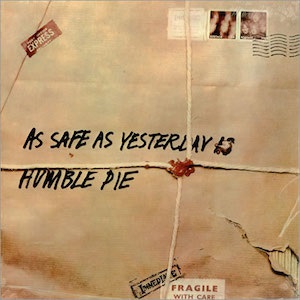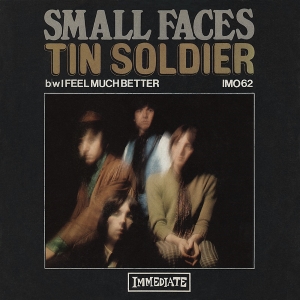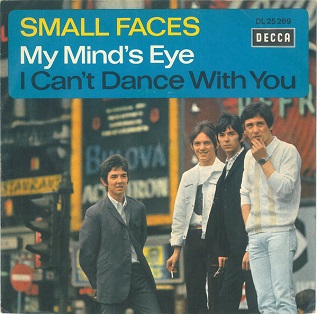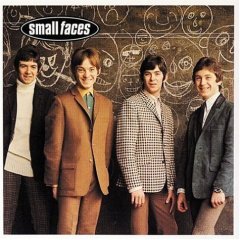Song profile
When "I Can't Make It" was released in 1967, Small Faces had acrimoniously left the management of Don Arden and were signed to Andrew Loog Oldham's Immediate label. However, due to contractual obligations, Decca released the song, and Immediate agreed to produce and license the song back to them until the issue was resolved. [2] The band refused to promote the single and as a direct result, the song only managed to climb to No. 26 in the charts. [3] The BBC also initially banned the song for the dubious sounding lyrics which they thought were of a sexual nature; the lyrics are actually ambiguous and it is left to the listener to decide their true meaning. [3]
The B-side, "Just Passing", is a short whimsical song only a minute long and is in the style of The Beach Boys song, "You Still Believe in Me".
In April 1967, Small Faces performed a live version of "I Can't Make It" on the well-known British television show, Morecambe and Wise, as well as their UK number-one single, "All or Nothing". The recording is notable for the particularly strong live vocal performance by Marriott. The episode was transmitted six months later. [4]
The song can be found on side two of the group's 1969 posthumous double-album The Autumn Stone. "I Can't Make It" and "Just Passing" were also released as bonus tracks on the deluxe editions of From the Beginning in 2012. [5] Furthermore, stereo mixes of both tracks are included on the deluxe editions of the band's 1967 eponymous album. [6]

Small Faces is the second studio album by Small Faces, released through Immediate Records on 23 June 1967. Although this was their first album for new manager Andrew Loog Oldham's Immediate label, recording actually commenced during their tenure with Decca Records, whom they left in January 1967 after severing professional ties with original manager Don Arden. As a result of the switch of label and management, Decca and Arden released an outtakes compilation album, From the Beginning in early June 1967 in order to sabotage the chart success of the Immediate Small Faces release - something that it managed to do to some extent when From the Beginning reached number 17 in the UK charts. The Immediate album shares its name with their 1966 Decca debut album, which has led to some confusion regarding the titles. As a result of this, it has been unofficially dubbed The First Immediate Album by several fans.
Anthony Jones was an American rock bassist. He played bass guitar for the British band Humble Pie, when Steve Marriott reformed the group in April 1980. Jones is credited on the Humble Pie albums On to Victory released by Atco in 1980, and Go for the Throat also released by Atco the following year.

"Itchycoo Park" is a song written by Steve Marriott and Ronnie Lane, first recorded by their group, the Small Faces. Largely written by Lane, it was one of the first music recordings to feature flanging, an effect at that time made possible by electro-mechanical processes. The location and etymology of the titular park has long been debated; many claiming it to be Little Ilford Park in Manor Park, East London, Valentine's Park in Ilford or Wanstead Flats in Wanstead, East London. The single was not featured on any of their UK albums, but was however featured on the North American release There Are But Four Small Faces.

As Safe as Yesterday Is is the debut studio album by British rock band Humble Pie, released in the UK in August 1969. The album peaked at number 32 in the UK Albums Chart. While the group, featuring former frontmen Steve Marriott and Peter Frampton, had technically formed in January 1969, Marriott's final touring commitments to his former band followed by legal wrangles with Frampton's old management had delayed any album releases until August, during which time the band rehearsed and recorded enough material to fill at least three albums.

"Tin Soldier" is a song released by the English rock band Small Faces on 2 December 1967, written by Steve Marriott. The song peaked at number nine in the UK singles chart and number 38 in Canada. It has since been covered by many other notable rock artists.

"Sha-La-La-La-Lee" was the third song by English R&B-influenced group Small Faces, recorded in December 1965 and released on 28 January 1966, reaching number three in the UK Singles Chart. It was also the first single by the group to feature Ian McLagan on keyboards.

"The Universal" is a UK single released by English R&B influenced group Small Faces on 28 June 1968 and reached number 16, staying in the top 40 for a total of 10 weeks.

"My Mind's Eye" was the sixth song released on 11 November 1966 by the successful English rock group Small Faces. It reached number four on the UK Singles Chart.

"Here Come the Nice" is a song by English rock band Small Faces. Written by guitarist Steve Marriott and bass guitarist Ronnie Lane, it was released as a single on 2 June 1967, through Immediate Records. The song, which was the band's debut on Immediate, was their first promoted release of 1967, following feuds with Decca Records. It marked a distinct turning point for Small Faces' career, being their first single to deliberately venture into psychedelia, though they'd previously done that on a few album tracks for Decca. The song's subject regarding a drug dealer somehow bypassed the BBC censors, who did not ban it, which resulted in the song managing to chart at number 12 on the UK Singles Chart during the summer of 1967. The song received mostly good reviews from music critics, with many positively noting the change of genres.
"I've Got Mine" was the second official song released by the English rock band Small Faces in 1965. The song failed to chart despite receiving favourable reviews in the British music press.

The Autumn Stone is a posthumous retrospective double album, and the second compilation album released in the UK by Small Faces in 1969 on the Immediate label.

From the Beginning is the first compilation album by the English rock band Small Faces. It was released by Decca Records of group material after the band had left the record label; it consisted of the band's Decca hit singles combined with various unreleased recordings. The album rose to Number 17 in the UK Album Chart.

"The Sad Bag of Shaky Jake" is a single released in 1969 by English rock band Humble Pie. The B-side "Cold Lady" was written by drummer Jerry Shirley in a R&B style and Shirley plays Wurlitzer piano and guitarist Peter Frampton plays the drums.

On to Victory is the ninth studio album recorded by the English rock band Humble Pie and the first with a new lineup including vocalist and guitarist Steve Marriott, drummer Jerry Shirley, vocalist and guitarist Bobby Tench from The Jeff Beck Group, and American bassist Anthony "Sooty" Jones. They recorded "Fool for a Pretty Face", which Marriott had written earlier and the song proved good enough for them to secure a recording contract with Atco in 1980. In UK their material was released by Jet Records, owned by the former Small Faces manager Don Arden. The album peaked #60 on the Billboard 200 album chart "Fool for a Pretty Face" was released as a single and reached #58 on the US singles charts and a promotional tour followed as part of The Rock'n Roll Marathon, supporting Frank Marino & Mahogany Rush, Angel & Mother's Finest.

"Get Yourself Together" is a song by British rock band Small Faces, first released in 1967. It was cut during their tenure on both Decca and Immediate Records in 1966 and 1967 and was written by the Marriott/Lane partnership, who wrote a majority of the Small Faces material. It is regarded as one of their best compositions. It remains one of their most popular efforts despite it not being released as single in the United Kingdom nor the United States and has since been covered by other influential artists.

"Talk to You" is a song by English rock band Small Faces. It was recorded in 1967 and issued as the B-side of "Here Come the Nice" that peaked at number 12 on the UK Singles Chart.
"(Tell Me) Have You Ever Seen Me?" is a song by English rock band Small Faces. It has a complicated release history and was issued by both Decca and Immediate Records in 1967. The track apparently had a working title of "Mystery" in 1966. Initially planned as the Small Faces debut single on Immediate in mid-1967, it was shelved due to threats from Decca.
"Green Circles" is a song by English rock band Small Faces first recorded in 1966. While not issued as a single in the United Kingdom, it was originally intended as the B-Side of "Here Come the Nice", their first single release on Immediate Records, this release was cancelled and the B-Side was replaced with "Talk to You." It remains one of the group's most well known and influential songs, and showcases the group's venture into psychedelic music, which would be prevalent in their later work, such as on "Itchycoo Park", "Lazy Sunday" and Ogdens' Nut Gone Flake.

"Patterns" is the eighth single by British rock band, Small Faces, first released on Decca Records in 1967. It was the first of two unauthorised singles released in the United Kingdom. It was written by the Small Faces primary songwriters Steve Marriott and Ronnie Lane. It became one of few singles by the group that features Lane on primary vocals, in contrast to Marriott's standard role as the group's lead vocalist.

In Memoriam is the first posthumous album release by East London rock band Small Faces after the announcement of their break-up in early 1969. It was released on 1 May 1969 through Immediate Records in West Germany only. Their second compilation album following 1967's From the Beginning, In Memoriam is a collection of live cuts and unreleased studio tracks. The studio material was recorded during 1967 and the 1968 sessions for Ogdens' Nut Gone Flake, and also included a few tracks possibly intended for their projected but unrealised fourth album 1862. The studio outtakes were complemented by five live tracks recorded on tour in November 1968.
















